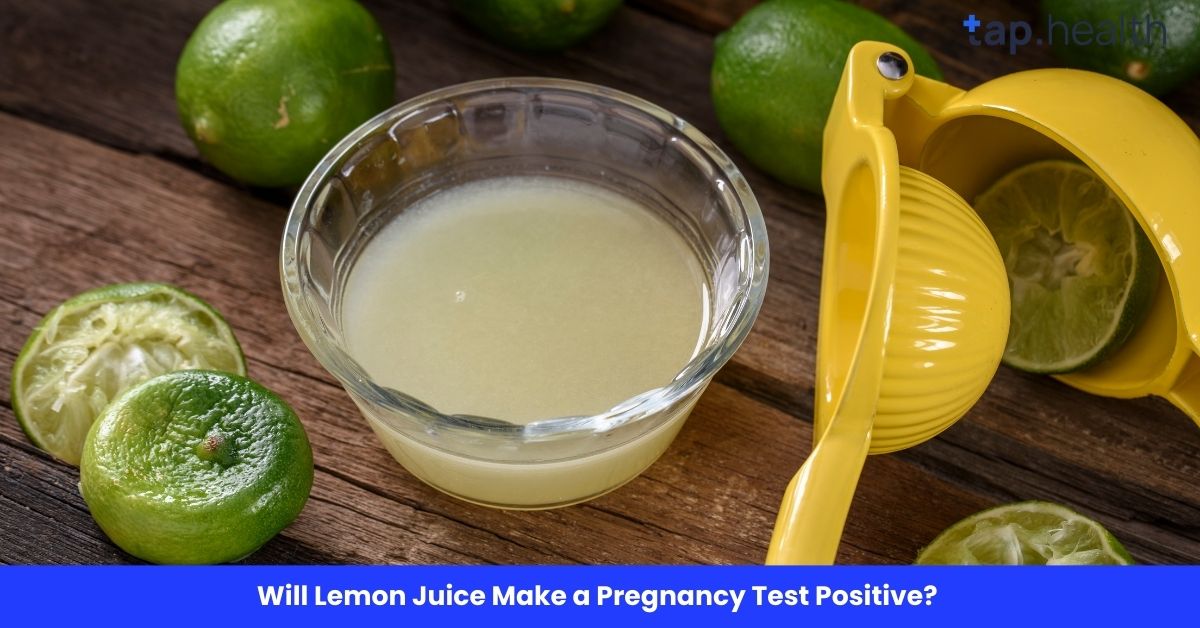Pregnancy tests are commonly used by women who suspect they might be pregnant. These tests are designed to detect the presence of human chorionic gonadotropin (hCG), a hormone produced during pregnancy. However, many myths have arisen over the years about how to manipulate or influence the results of a pregnancy test, one of the most popular being the idea that lemon juice can make a pregnancy test turn positive.
If you’ve heard this myth or come across it online, you may be wondering: Will lemon juice really make a pregnancy test positive?
In this blog post, we’ll explore the relationship between lemon juice and pregnancy tests, clear up the misconceptions, and give you reliable, scientifically backed information about how pregnancy tests work and how you should approach testing for pregnancy.
What Is a Pregnancy Test and How Does It Work?
Before addressing the myth, let’s first understand how pregnancy tests work. Pregnancy tests, both home pregnancy tests (HPTs) and tests conducted at clinics, detect the presence of hCG in a woman’s urine or blood. This hormone is produced when a fertilized egg implants in the uterus, signaling early pregnancy.
Home Pregnancy Tests (HPTs)
Home pregnancy tests use urine to detect hCG levels. These tests are typically easy to use and can be done privately at home. Most tests have a line or a plus/minus indicator that shows whether hCG is present.
- Positive result: A line or symbol will appear, indicating that the hCG hormone was detected in your urine.
- Negative result: No line or symbol appears, meaning hCG was not detected.
Blood Pregnancy Tests
In contrast, blood tests are done in a medical setting and can detect lower levels of hCG in the body. These are typically more accurate, especially in the very early stages of pregnancy.
Can Lemon Juice Affect a Pregnancy Test?
Lemon juice has no real impact on the results of a pregnancy test. It does not alter the presence or absence of hCG in your urine, so it cannot make a pregnancy test positive or negative.
Despite the widespread myth that lemon juice or other substances can interfere with pregnancy tests, this simply isn’t true. Pregnancy tests are designed to detect hCG, and no external substance (such as lemon juice, bleach, or vinegar) can change the chemical reaction that occurs during the test.
Why Do People Think Lemon Juice Affects Pregnancy Tests?
The myth likely originates from the idea that acidic substances like lemon juice can somehow “alter” the chemistry of the test. However, the truth is that pregnancy tests are designed with a specific chemical composition that allows them to react only to hCG, and no other substance will have a meaningful effect on the result.
Moreover, some people may mistakenly believe that a failed pregnancy test, when no line appears, is somehow the result of lemon juice, when in reality, a negative result simply means that hCG was not detected in the urine.
What Happens If You Add Lemon Juice to a Pregnancy Test?
If you were to add lemon juice or any other substance to a pregnancy test, it’s likely to damage the test or give inaccurate results. Adding anything that is not part of the test’s design could cause the test to malfunction. In some cases, the test could even show false positive or false negative results, but this would be due to contamination, not because of the lemon juice itself.
Can Lemon Juice Cause a False Positive?
No, lemon juice cannot cause a false positive on a pregnancy test. A false positive result occurs when a test shows a positive result even though the person is not pregnant. This can happen due to factors like:
- Testing too early in the pregnancy
- Certain medications (like fertility treatments)
- Medical conditions (such as ovarian cysts or an early miscarriage)
In these cases, hCG might be present in the urine, but it’s not necessarily due to pregnancy. Lemon juice, however, has no effect on this process and cannot trigger a positive result on a pregnancy test.
What About Other Household Substances?
The myth about lemon juice isn’t the only one out there. Other household substances, such as bleach, vinegar, or toothpaste, have also been wrongly believed to alter the results of pregnancy tests. The reality is that none of these substances have any effect on the outcome of a test.
If you ever feel tempted to try one of these “home remedies,” it’s important to remember that they can damage the test and lead to incorrect results, causing unnecessary confusion.
How to Get an Accurate Pregnancy Test Result
For the most accurate results, here’s what you should do when using a pregnancy test:
1. Follow the Instructions Carefully
Every pregnancy test comes with specific instructions. These instructions provide the best way to handle the test for accurate results. Always read the directions before using the test.
2. Test in the Morning
For the best chance of detecting hCG in your urine, it’s recommended to take the test first thing in the morning. Your urine is typically more concentrated at this time, which makes it easier for the test to detect the hormone.
3. Wait the Recommended Time
Pregnancy tests usually require a few minutes to show results. Do not read the test result too early or too late. Reading it before the recommended time can lead to inaccurate results, and reading it too late might cause the appearance of an evaporation line, which can be mistaken for a positive result.
4. Consider the Timing
Testing too early may give you a false negative, as the levels of hCG may not be high enough to detect. Wait at least a week after your missed period to ensure the best chance of an accurate result.
5. Use a Reliable Test
Make sure you are using a reputable pregnancy test from a well-known brand. While cheaper tests may be available, they may not be as reliable. A higher-quality test will have a better chance of giving you an accurate result.
Can Lemon Juice Help in Other Areas of Health?
While lemon juice has no effect on pregnancy tests, it does have other health benefits. Lemon juice is rich in vitamin C, antioxidants, and has alkalizing effects in the body. It’s often used as a natural remedy for:
- Boosting the immune system
- Improving digestion
- Detoxifying the body
- Promoting healthy skin
Adding lemon juice to your daily routine can be a refreshing way to improve your overall health, but don’t rely on it for influencing pregnancy test results.
Real-Life Scenario
Imagine someone reads online that lemon juice can help determine pregnancy and decides to pour it on a test strip or mix it with urine. The result will not be reliable. A positive test only occurs when hCG is present, which lemon juice cannot influence. Relying on such methods can lead to confusion and anxiety.
Expert Contribution
Medical professionals and gynecologists state that home remedies like lemon juice, vinegar, or baking soda are myths. Pregnancy tests are designed to detect hCG with high accuracy. Only a urine or blood test under proper conditions can confirm pregnancy. Using unverified methods is not recommended.
Recommendations Grounded in Proven Research and Facts
- Use a reliable pregnancy test: Urine tests from pharmacies are accurate if used after a missed period.
- Follow instructions carefully: Read the timing and steps on the test for best results.
- Consult a healthcare provider: For confirmation or if results are unclear, a blood test at a clinic is the most reliable method.
- Avoid home remedies: Lemon juice, vinegar, or other DIY tests are not scientifically proven and can give misleading results.
FAQs About Lemon Juice and Pregnancy Tests
1. Can lemon juice make a pregnancy test positive?
No, lemon juice cannot make a pregnancy test positive. Pregnancy tests detect the presence of hCG in your urine, and no external substance, including lemon juice, can change that.
2. Can lemon juice interfere with a pregnancy test result?
Lemon juice should not interfere with the results of a pregnancy test. However, adding it or any other substance to the test may damage the test or lead to inaccurate results.
3. What should I do if I think the pregnancy test is wrong?
If you believe a pregnancy test result is inaccurate, you can try testing again after a few days or visit a healthcare professional for a blood test, which is more accurate in detecting early pregnancy.
4. How soon after a missed period can I take a pregnancy test?
Most home pregnancy tests are reliable about one week after a missed period. Testing too early may result in a false negative.
5. Can anything cause a false positive?
A false positive can occur due to factors like taking certain medications, having a miscarriage, or certain medical conditions. Always consult a doctor if you’re unsure about the results.
Conclusion: Will Lemon Juice Make a Pregnancy Test Positive?
In short, no, lemon juice will not make a pregnancy test positive. The myth that lemon juice can influence a pregnancy test is simply that—a myth. Pregnancy tests are scientifically designed to detect hCG, and no external substances can change this process.
For the most reliable results, it’s best to follow the instructions on the pregnancy test and consult a doctor if you have concerns or doubts. Always remember that the best way to confirm pregnancy is through accurate testing, whether at home or in a medical setting.
Stay informed, and if you’re unsure about your results, reach out to a healthcare provider for professional guidance.



